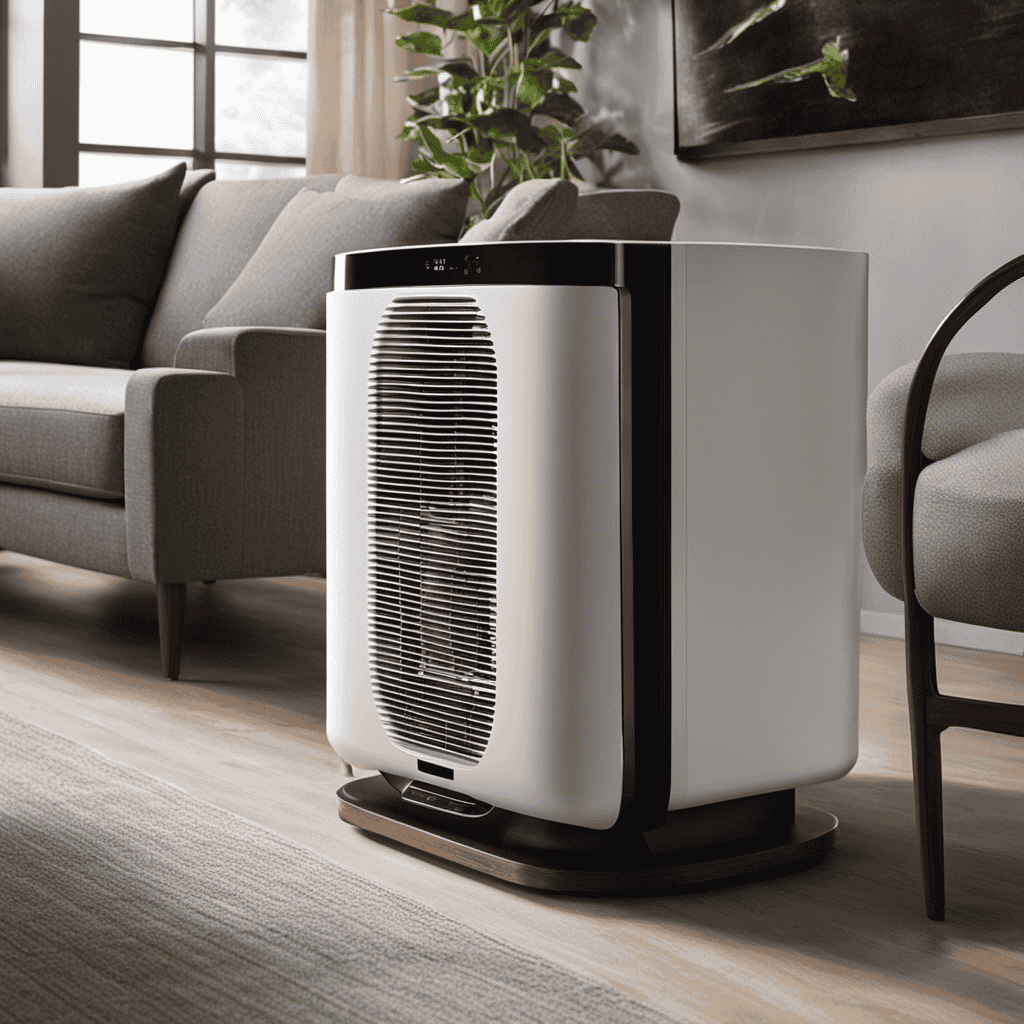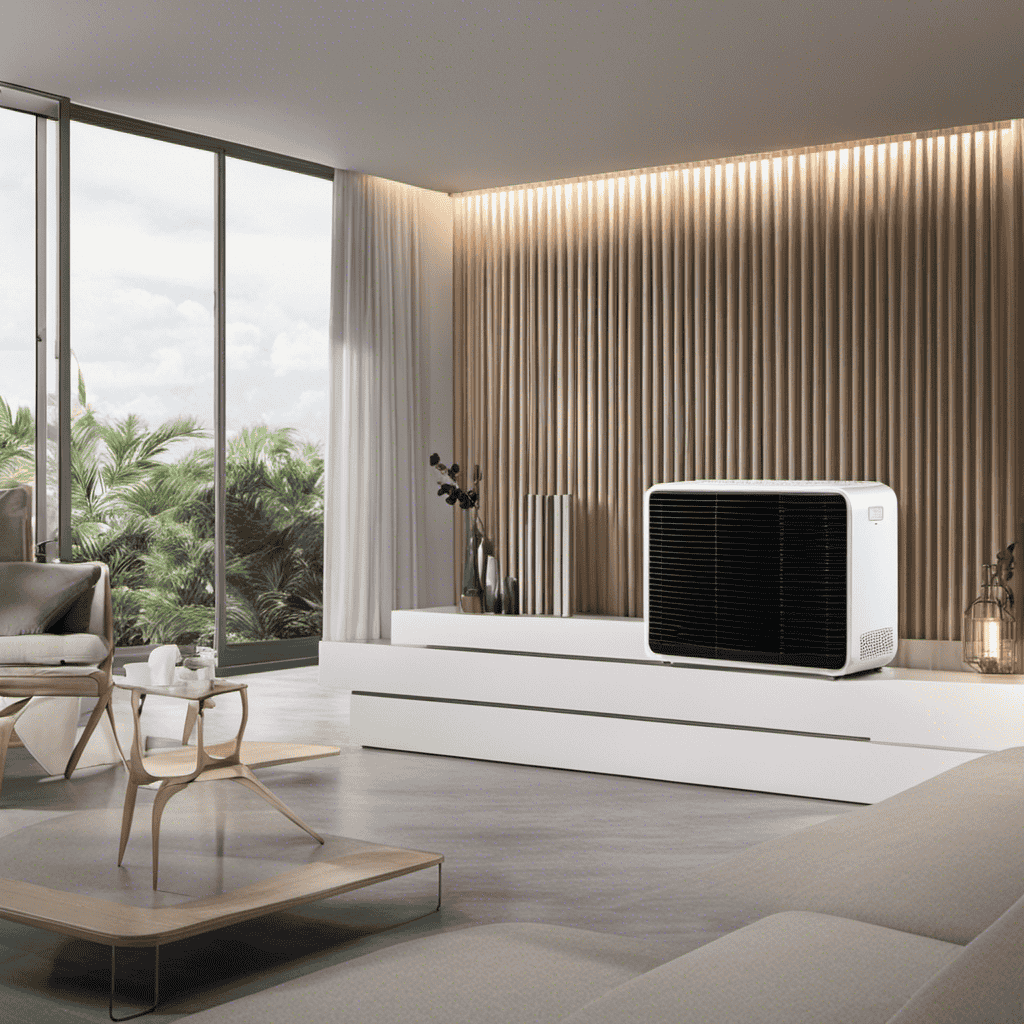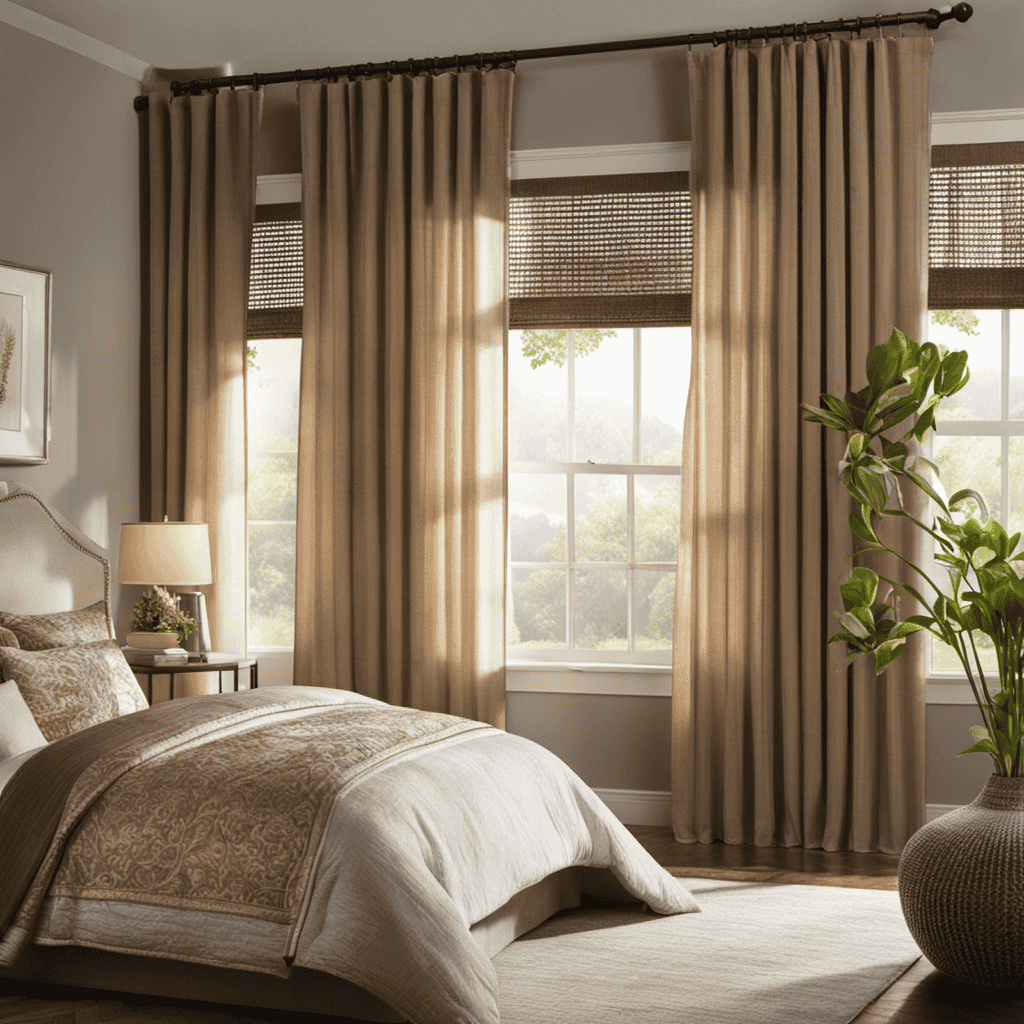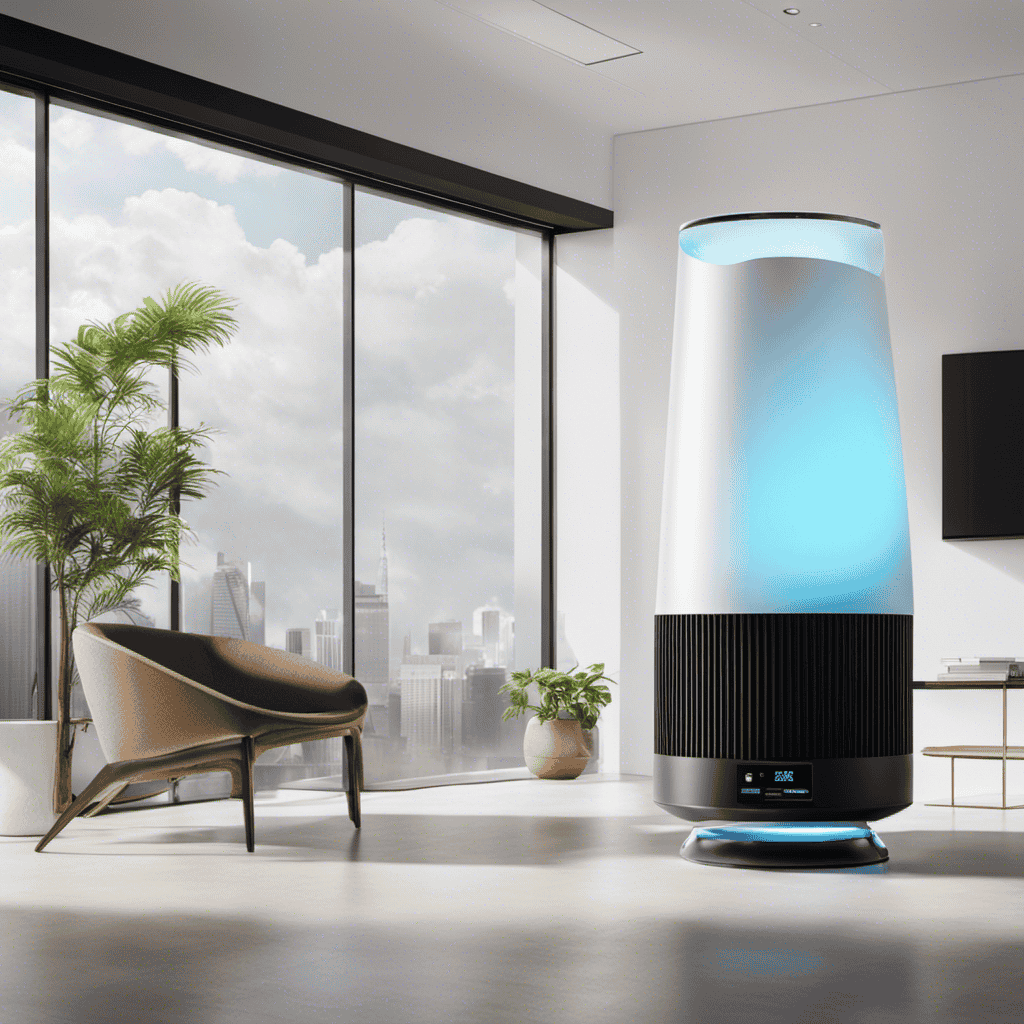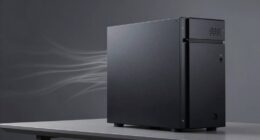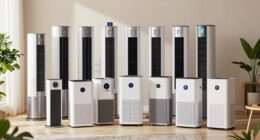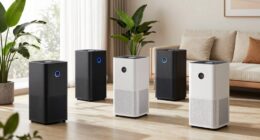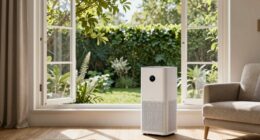As the popular saying goes, ‘Clean air, clear mind.’ When it comes to keeping a healthy indoor environment, the significance of a reliable air purifier should not be overlooked.
In this article, I will delve into the world of particulate matter and explain why it is crucial to choose an air purifier that effectively tackles this issue. By understanding the role of particulate matter numbers and exploring different types of air purifiers available, you will be well-equipped to make an informed decision.
So, let’s dive in and discover the benefits of using a particulate matter number air purifier.
Key Takeaways
- Particulate matter numbers indicate the ability of an air purifier to filter particles, and effective filtration reduces health issues.
- HEPA filters are widely recognized for capturing tiny particles, while electrostatic precipitators and activated carbon filters also remove particulate matter.
- Different types of air purifiers are designed to tackle particulate matter, with HEPA filters being the most effective.
- Factors to consider when choosing an air purifier include room size, filtration system (preferably with a HEPA filter), noise level, energy efficiency, and maintenance requirements.
Understanding Particulate Matter
If you want to understand particulate matter, you should know that it refers to tiny particles in the air that can be harmful to your health. These particles come from various sources, both natural and man-made.
Natural sources include dust, pollen, and volcanic eruptions, while man-made sources include vehicle emissions, industrial processes, and tobacco smoke.
Particulate matter can have a significant impact on indoor air quality, as these particles can easily enter buildings through ventilation systems and open windows. Once inside, they can accumulate and linger in the air, leading to poor indoor air quality.
This can have adverse effects on the health of individuals, causing respiratory problems, allergies, and even triggering asthma attacks.
It is crucial to have proper air filtration systems, such as air purifiers, to remove particulate matter and improve indoor air quality.
Importance of Air Purification
You should prioritize air purification as it plays a significant role in maintaining a healthy living environment. The importance of air quality cannot be overstated, as the air we breathe can have a direct impact on our health. Air pollution, caused by pollutants such as particulate matter, can lead to a range of health effects, from respiratory problems to cardiovascular diseases. Investing in an air purifier can help remove these harmful pollutants from the air, improving the overall air quality in your home. Here is a table summarizing the health effects of air pollution:
| Health Effects of Air Pollution |
|---|
| Respiratory problems |
| Cardiovascular diseases |
| Allergies |
| Asthma attacks |
Key Features of a Good Air Purifier
When it comes to choosing a good air purifier, two key features to consider are filter efficiency standards and noise level considerations.
Filter efficiency standards are important because they determine how effectively the air purifier can remove pollutants and allergens from the air.
Noise level considerations are also crucial, as a noisy air purifier can be disruptive and annoying, especially if you plan to use it in a bedroom or office space.
It is important to find a balance between filter efficiency and noise level to ensure an effective and peaceful air purification experience.
Filter Efficiency Standards
The filter efficiency standards determine the effectiveness of particulate matter air purifiers. When it comes to filter accuracy, HEPA filters are considered the gold standard. HEPA stands for High Efficiency Particulate Air, and these filters are designed to remove 99.97% of particles as small as 0.3 microns from the air.
This means that they can effectively capture common allergens like dust, pollen, pet dander, and mold spores. HEPA filters are also capable of trapping finer particles such as smoke and bacteria.
When choosing an air purifier, it is important to look for one that meets the HEPA filter efficiency standards. This ensures that you are getting a high-quality purifier that will effectively clean the air in your home or office.
Noise Level Considerations
Noise level is an important factor to consider when choosing an air purifier for your home or office. Sound pollution can have a negative impact on our health and well-being, so it’s crucial to select an air purifier that operates quietly. To help you make an informed decision, here is a table comparing the decibel levels of different air purifiers:
| Air Purifier Model | Decibel Level |
|---|---|
| Model A | 35 dB |
| Model B | 40 dB |
| Model C | 45 dB |
| Model D | 50 dB |
| Model E | 55 dB |
Lower decibel levels indicate quieter operation, which can be especially beneficial in environments where noise sensitivity is a concern, such as bedrooms or offices. By considering the noise level of an air purifier, you can ensure a more peaceful and comfortable living or working environment while effectively reducing air pollution.
The Role of Particulate Matter Numbers
One important factor to consider when choosing an air purifier is its ability to effectively filter particulate matter numbers. Particulate matter refers to tiny particles suspended in the air, such as dust, pollen, smoke, and other pollutants. Measuring pollution levels is crucial as high levels of particulate matter can have detrimental health effects on individuals, especially those with respiratory conditions.
Here are five key reasons why you should pay attention to the particulate matter numbers when selecting an air purifier:
-
Health effects: High levels of particulate matter can cause respiratory issues, allergies, and even cardiovascular problems.
-
Asthma management: Effective filtration of particulate matter aids in reducing asthma triggers and improving overall respiratory health.
-
Allergen reduction: Particulate matter includes common allergens like dust mites and pollen, so filtering them out can alleviate allergy symptoms.
-
Smoke elimination: Particulate matter numbers indicate the purifier’s ability to remove smoke particles, making it essential for households with smokers or fire-prone areas.
-
Indoor air quality improvement: By reducing particulate matter, air purifiers enhance the overall air quality indoors, promoting a healthier living environment.
Types of Air Purifiers for Particulate Matter
In my previous discussion, I explained the role of particulate matter numbers in air purifiers. Now, let’s delve into the various types of air purifiers available that meet the efficiency standards for particulate matter removal.
There are several types of air purifiers designed specifically to tackle particulate matter. High-efficiency particulate air (HEPA) filters are widely recognized for their effectiveness in capturing tiny particles. These filters can remove 99.97% of particles as small as 0.3 micrometers.
Another type is electrostatic precipitators, which use an electric charge to attract and collect particles. They are particularly effective against larger particles. Activated carbon filters are also commonly used to remove particulate matter along with odors and chemicals.
With this understanding of the different types of air purifiers available, let’s now explore the factors to consider when choosing an air purifier.
Factors to Consider When Choosing an Air Purifier
When choosing an air purifier, you should consider factors such as the size of the room and the level of pollutants present.
Here are some important factors to consider when selecting an air purifier:
-
Room size: Choose an air purifier that is suitable for the size of the room you want to purify. A larger room may require a purifier with a higher Clean Air Delivery Rate (CADR).
-
Filtration system: Look for an air purifier that uses a high-efficiency particulate air (HEPA) filter. HEPA filters can capture small particles and allergens, improving the air quality in your home.
-
Noise level: Consider the noise level of the air purifier, especially if you plan to use it in a bedroom or an area where quiet is important.
-
Energy efficiency: Opt for an energy-efficient air purifier to minimize electricity consumption and save on energy bills.
-
Maintenance: Check the maintenance requirements of the air purifier, including filter replacements and cleaning.
Considering these factors will help you choose an air purifier that best suits your needs and provides the benefits of using clean air in your home.
Now, let’s move on to how to measure particulate matter in the air.
How to Measure Particulate Matter in the Air
Measuring the level of particles in the atmosphere is essential for assessing air quality. Accurate measurement of particulate matter (PM) is crucial as it provides valuable information about the health effects of air pollution. To measure PM, various instruments and techniques are used, including air quality monitors and samplers. These devices collect air samples and analyze the concentration of particles present. The accuracy of measurement is determined by factors such as calibration, sampling duration, and the sensitivity of the instrument. It is important to ensure that the measurements are reliable and consistent to obtain accurate data for assessing air quality and understanding its impact on human health.
| Measurement Method | Accuracy |
|---|---|
| Gravimetric | High |
| Optical | Moderate |
| Laser Scattering | Moderate |
| Beta Attenuation | High |
The Link Between Particulate Matter and Health
To understand the impact of particulate matter on your health, it is important to be aware of the link between air pollution and respiratory problems. Here are some key points to consider:
- Particulate matter is a mixture of solid and liquid particles suspended in the air.
- Air pollution, particularly from sources such as vehicle emissions, industrial processes, and burning of fossil fuels, contributes to the presence of particulate matter in the air.
Exposure to high levels of particulate matter can lead to various health effects, including respiratory issues, such as asthma and bronchitis. Particulate matter can also worsen existing respiratory conditions and increase the risk of heart attacks and strokes.
- Vulnerable populations, such as children, older adults, and individuals with pre-existing health conditions, are more susceptible to the adverse effects of particulate matter exposure.
Understanding the role of air pollution and its health effects is crucial for taking steps to protect ourselves and improve air quality.
Benefits of Using a Particulate Matter Number Air Purifier
If you’re looking to improve your indoor air quality, consider using a particulate matter number air purifier to help reduce the presence of harmful particles in your home. These air purifiers are designed to filter out particulate matter, which includes dust, pollen, pet dander, and other pollutants that can negatively affect your health.
By removing these particles from the air, a particulate matter number air purifier can provide several health benefits, including:
-
Reduction in allergy symptoms: By eliminating allergens from the air, these purifiers can help alleviate symptoms such as sneezing, coughing, and itchy eyes.
-
Improved respiratory health: Breathing in clean air can reduce the risk of respiratory infections and asthma attacks.
-
Better sleep: Cleaner air can lead to better quality sleep, as it reduces the potential for irritants that could disrupt your sleep patterns.
-
Enhanced overall well-being: Cleaner air can contribute to a healthier environment, promoting overall wellness and reducing the risk of respiratory illnesses.
When choosing a particulate matter number air purifier, consider reputable brands such as Dyson, Honeywell, Blueair, Coway, and Rabbit Air. These brands have a proven track record of producing quality air purifiers that effectively remove particulate matter from the air.
Common Misconceptions About Air Purifiers
One common misconception about air purifiers is that they are only effective for people with allergies. However, this is not true. Air purifiers are beneficial for everyone, regardless of whether they have allergies or not. Here are some common myths about air purifiers that need to be debunked:
- Air purifiers are only for people with allergies.
- Air purifiers eliminate all types of indoor pollutants.
- Air purifiers require high maintenance.
- Air purifiers are noisy and disrupt the peaceful environment.
- Air purifiers are expensive and not worth the investment.
In reality, air purifiers are effective in removing airborne particles, such as dust, pet dander, mold spores, and even some viruses. They can improve indoor air quality, leading to better respiratory health for everyone, not just those with allergies. Additionally, modern air purifiers are designed to be energy-efficient, quiet, and require minimal maintenance. The initial investment may seem high, but the long-term benefits outweigh the cost.
It’s important to separate fact from fiction when it comes to air purifier effectiveness and debunk these common myths.
Tips for Maintaining Your Air Purifier’s Efficiency
Maintaining the efficiency of an air purifier is crucial for ensuring clean and healthy air in your home. To achieve this, regular filter replacement is essential as it helps to trap and remove airborne particles effectively.
Additionally, proper cleaning techniques, such as wiping down the exterior and removing any built-up dust, can help improve the overall performance of the purifier.
Lastly, it is important to avoid air flow obstructions by placing the unit in a well-ventilated area and keeping it away from objects that may block the airflow, as this can hinder its ability to effectively filter the air.
Regular Filter Replacement
Regularly replacing the air purifier filter is essential for optimal performance. Here’s why:
-
Filter lifespan: Over time, air purifier filters accumulate dust, allergens, and other particles. As a result, their effectiveness decreases, and they need to be replaced to maintain clean air quality.
-
Filter replacement cost: While replacing filters may seem like an additional expense, it is a necessary investment in your health and well-being. The cost of filter replacement is far outweighed by the benefits of breathing clean, purified air.
Proper cleaning techniques, such as vacuuming or wiping down the exterior, can help maintain the overall efficiency of the air purifier. However, these techniques do not replace the need for regular filter replacement.
Proper Cleaning Techniques
Properly cleaning the exterior of your air purifier can help maintain its efficiency. Regular maintenance is essential for keeping your air purifier in top condition and ensuring it functions optimally. Here are some proper cleaning techniques and maintenance tips to follow:
| Cleaning Technique | Maintenance Tip |
|---|---|
| Dusting the exterior | Use a soft, dry cloth to remove dust |
| Vacuuming the vents | Use a brush attachment to remove debris |
| Wiping the control panel | Use a damp cloth and mild detergent |
| Cleaning the pre-filter | Rinse with water and let it air dry |
| Replacing the filter | Follow the manufacturer’s guidelines |
Avoiding Air Flow Obstructions
Now that we’ve discussed proper cleaning techniques for air purifiers, let’s move on to another important aspect of maintaining optimal performance: avoiding air flow obstructions.
It is crucial to ensure that the air purifier has unobstructed airflow in order to effectively filter and circulate clean air throughout the room. Here are some tips to maximize air circulation and avoid air flow restrictions:
- Keep the air purifier at least 12 inches away from walls or furniture.
- Avoid placing the air purifier behind curtains or drapes.
- Regularly clean or replace the air filters to prevent clogging.
- Ensure that the air intake and outlet vents are clear of dust and debris.
- Avoid placing objects on top of the air purifier that could block the airflow.
What Size Air Purifier is Best for Removing Particulate Matter?
When it comes to removing particulate matter from your indoor air, choosing the right air purifier size is crucial. A larger room will require a higher capacity air purifier to effectively remove particles and improve air quality. Be sure to consider the square footage of the room when selecting the right air purifier size.
Conclusion
In conclusion, choosing a good particulate matter number air purifier is like finding a knight in shining armor for your indoor air quality.
With its advanced filtration system and ability to remove harmful particles, it becomes your trusty companion in the battle against pollution.
It’s not just about breathing clean air, but also safeguarding your health and well-being.
So, don’t underestimate the power of a reliable air purifier in this polluted world.
Let it be your shield, protecting you from the invisible enemies lurking in the air.
